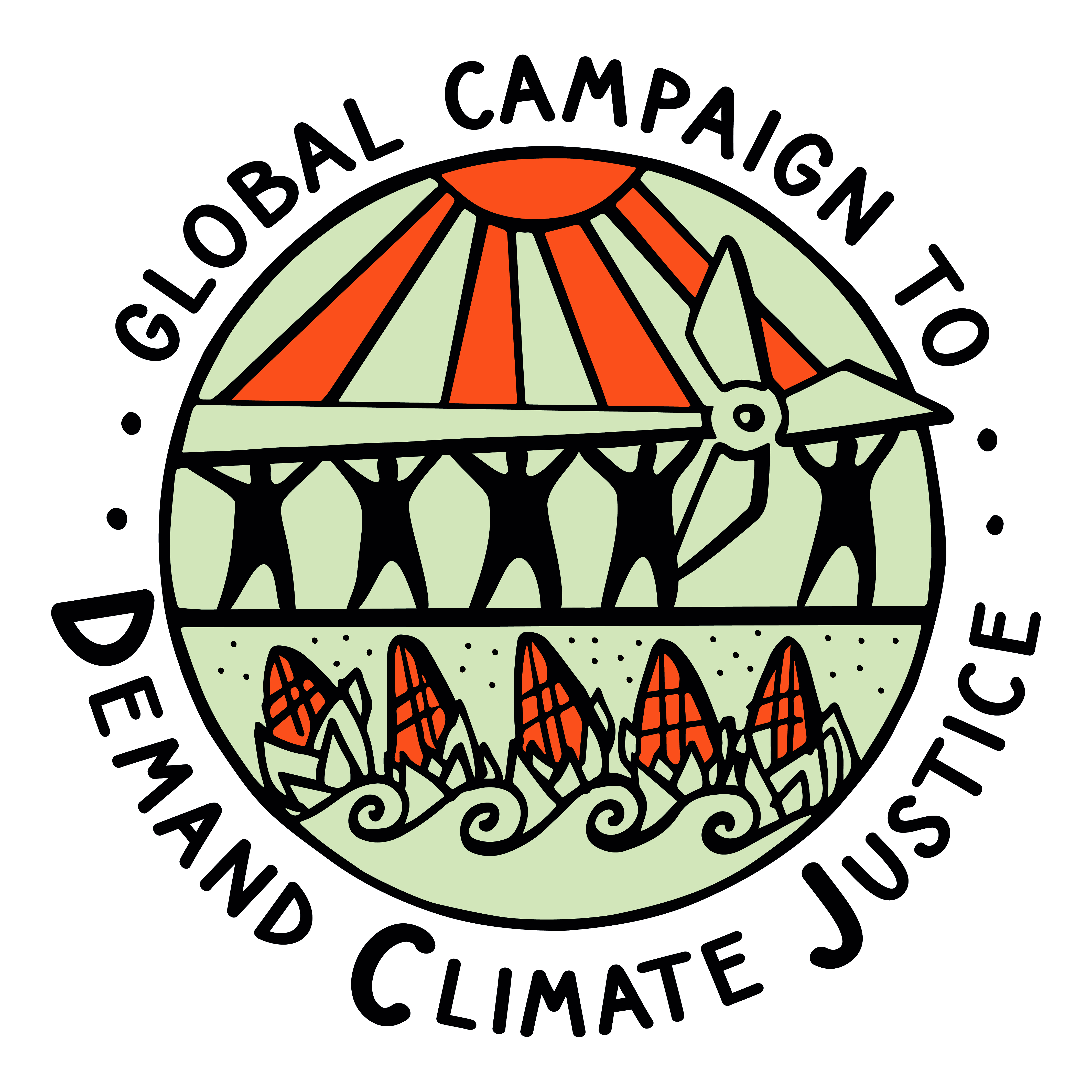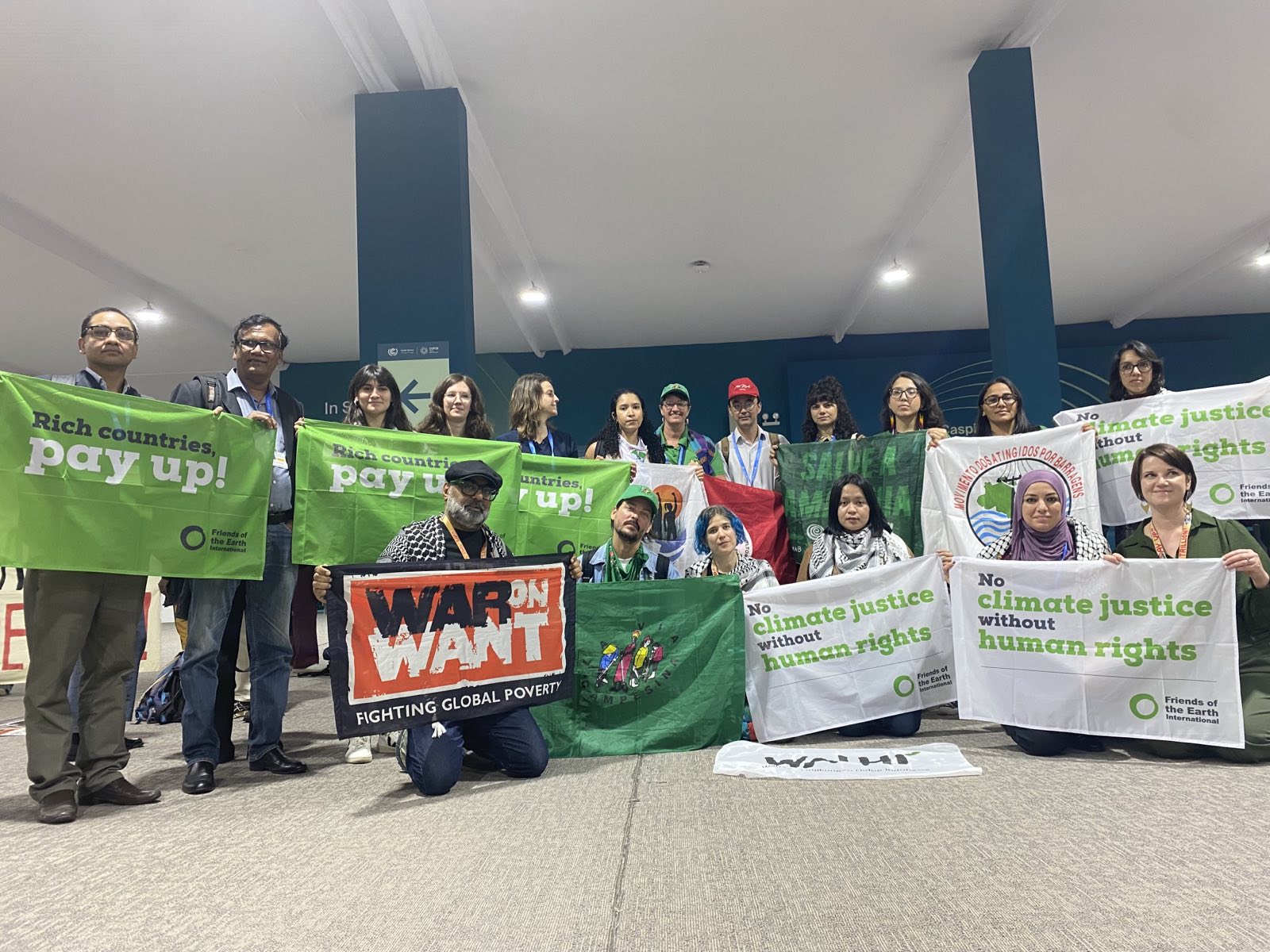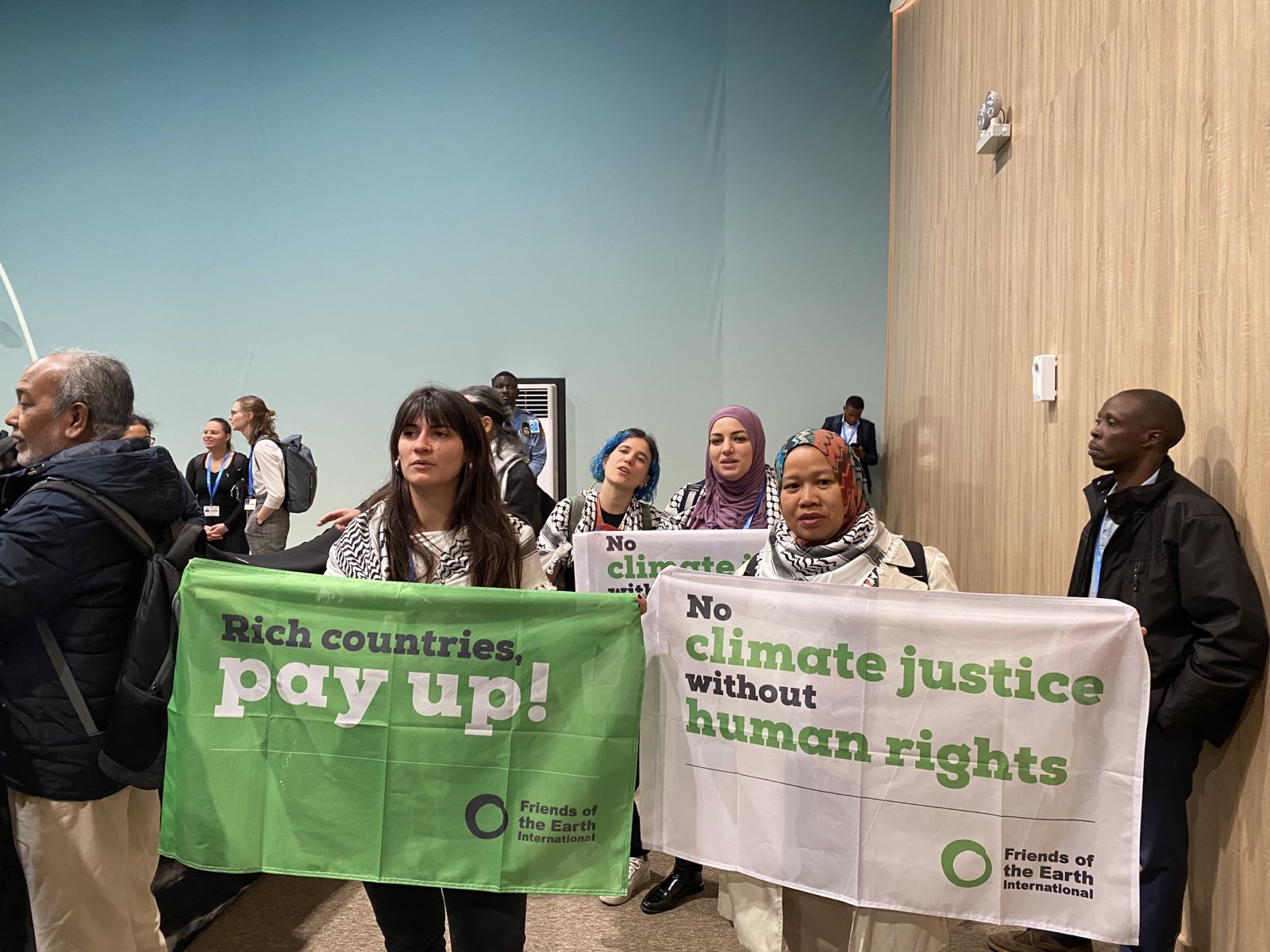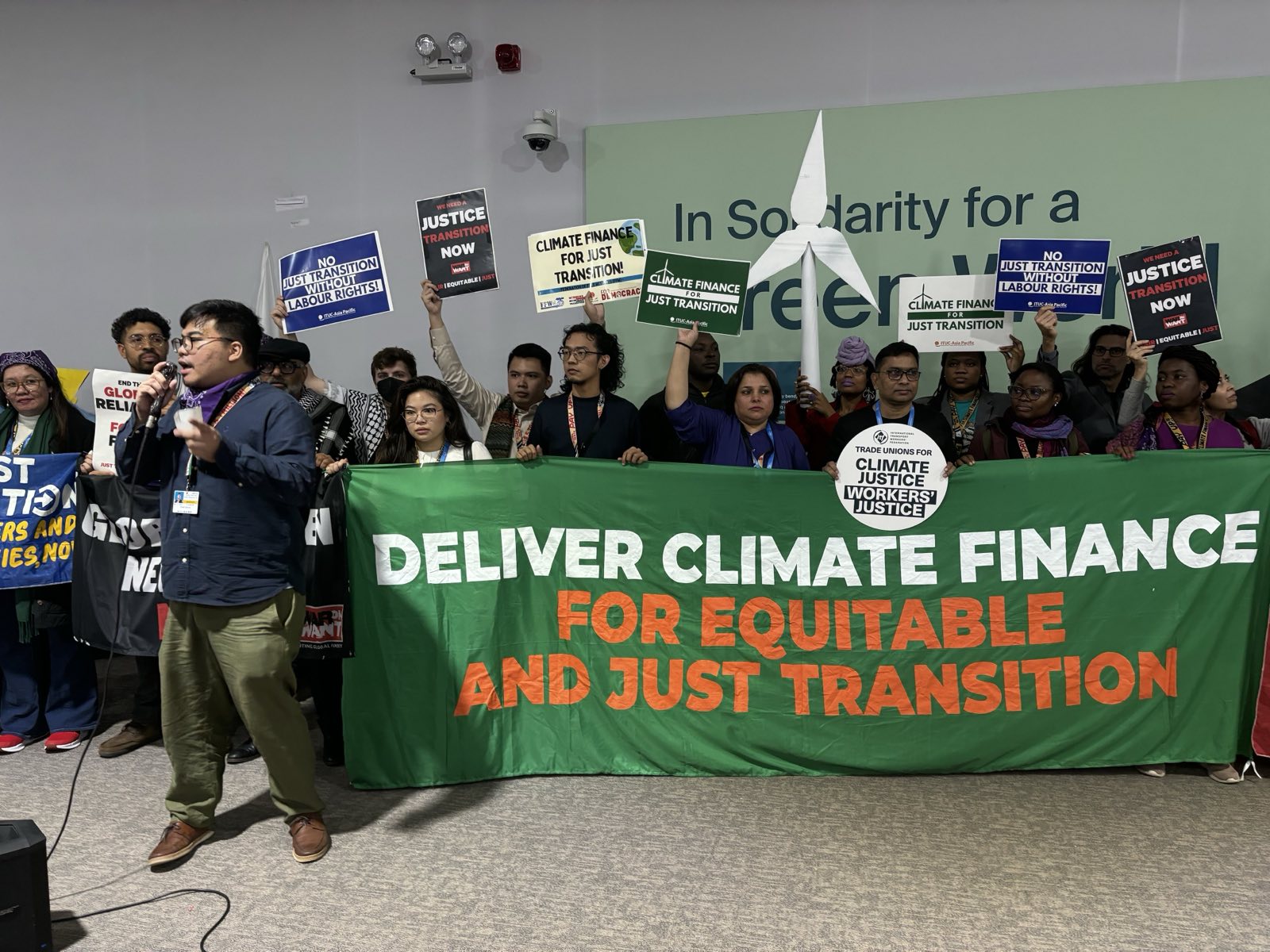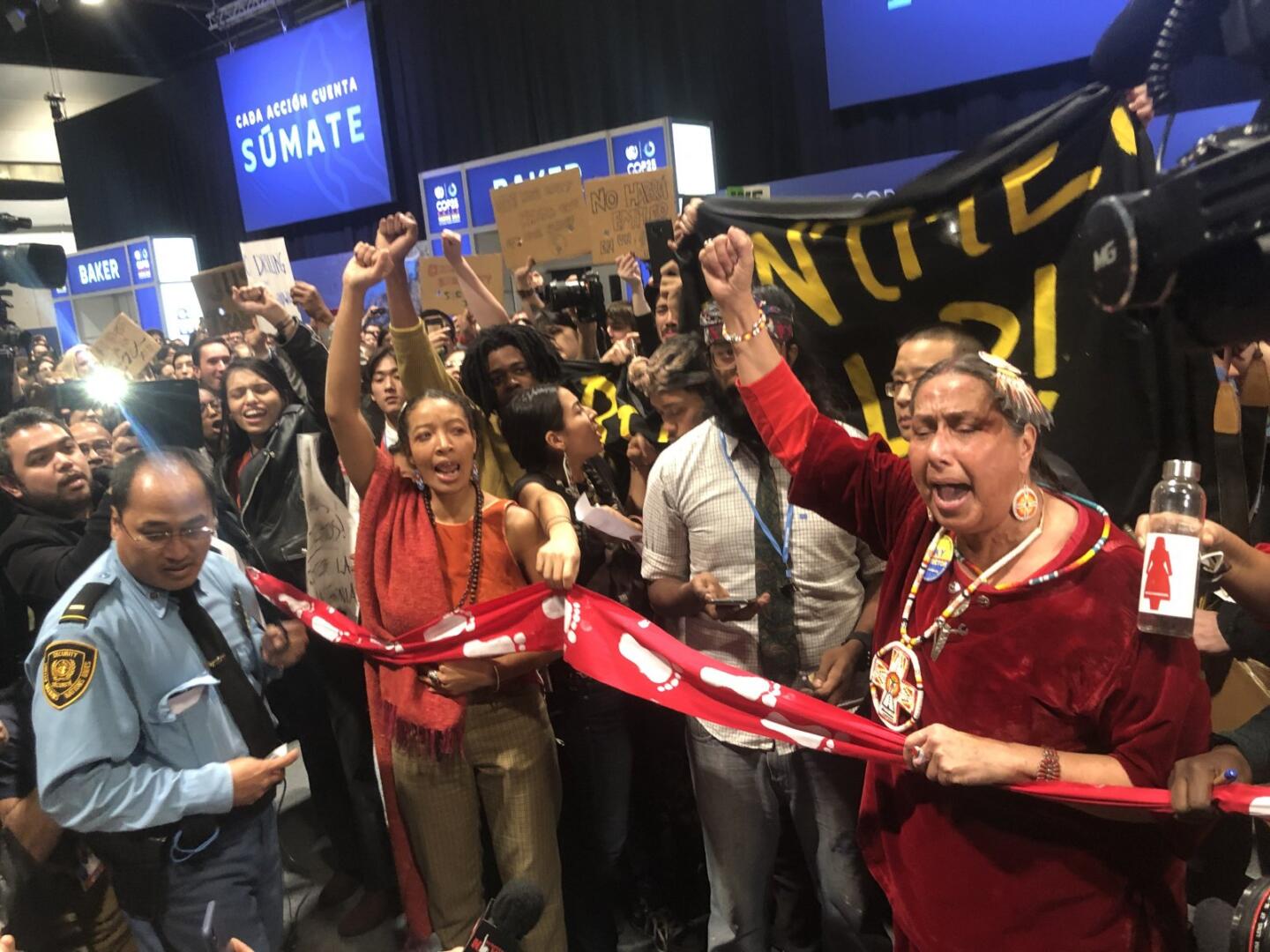Climate justice groups condemn COP29’s carbon markets decision setting the tone for corporate profits to prevail people’s interests
PRESS RELEASE
BAKU, AZERBAIJAN, 11 NOV 24 – As the global community gathers for the start of COP29, climate justice groups deplore the gaveling through of harmful carbon markets on the first day of the conference. This is not only an undemocratic process that threatens the credibility of this conference, it sets the tone for this COP to put Big Polluters’ profits above people’s rights.
The failure of voluntary carbon markets have shown that carbon markets, offsets, and removals do not work. Instead, they provide a smokescreen for big polluters to keep on emitting at the expense of people and nature. Time and again, these neocolonial schemes have resulted in land grabs, Indigenous Peoples rights and human rights violations, and the undermining of food sovereignty.
Fully operationalizing carbon markets on the first day of COP29 sends an appalling message to the world for a COP that is set to see the delivery of urgently needed climate finance: Big Polluters and Global North governments may celebrate this as a success, and many will argue that carbon markets can provide the finance needed for a just energy transition, adaptation, and loss and damage in the global South.
But carbon markets only fill the pockets of Big Polluters, they cannot – and will not – deliver the climate finance needed and owed to developing countries. The gavelling through of this decision on the first day of COP29 sets a dangerous precedent. The documents from the Supervisory Body must go through the Conference of the Parties serving as the meeting of the Parties to the Paris Agreement (CMA) for all parties to negotiate on. The rushing through of this decision is undemocratic and undermines the whole process.
Real, proven, community-centered and cost-effective solutions to justly address the climate crisis are increasingly being swept aside in favor of these industry-basked, risky, expensive, and harm-inducing false solutions. Climate justice begins with ending financing for and promotion of false solutions, instead, this COP must deliver the urgently needed climate finance owed to the global South. Bulldozing through Article 6.4 on the first day of the COP without any discussions and opportunity to negotiate by the Parties undermines the CMA, the COP and subverts the entire UNFCCC COP process.
“Bulldozing through the Carbon Market methodology and text on the first day of the COP without any discussions and opportunity to negotiate by the Parties undermines the CMA, the COP and subverts the entire UNFCCC COP process. The arrival of the carbon market through the backdoor is a bad beginning for this COP, the global south, the Indigenous Peoples, forest and the front line communities. A global mobilization against the carbon markets is the need of the hour now.”
Souparna Lahiri, Senior Climate and Biodiversity Policy Advisor, Global Forest Coalition
“Carbon markets put Indigenous Peoples’ lives at risk. For over 20 years, these fraudulent mechanisms have allowed fossil fuel industries to continue with impunity. At this COP 29, the corporate capture has superseded any semblance of UN democracy with a move from the COP Presidency to go rogue and push through Article 6 carbon market methodology and removals texts without following party-driven procedure. IEN strongly opposes geoengineering technologies in the activities on removals text, which still has not produced a list of what removals technologies will even be included in A6.4 as an offset. We will continue to voice our opposition against Article 6 carbon markets.
Tom Goldtooth, Executive Director of the Indigenous Environmental Network.
“The gavelling through of carbon markets on the first day of COP29 is unacceptable and undermines the credibility of the whole process. Further, it is opening the floodgates for a global carbon market that will have devastating impacts on communities in the Global South, on Indigenous Peoples, and on small peasant farmers first and foremost. Carbon markets are not climate finance, and we cannot accept these neocolonial schemes to be propped as a success of COP29 in lieu of paying the climate debt owed to the Global South.”
Lise Masson, Friends of the Earth International.
“Carbon markets are not climate finance. They are not the meaningful Real Zero action we desperately need while the world reaches record-breaking temperatures. They are a get-out-of-jail-free card for the world’s Big Polluters and Global North governments. And they condemn people and the planet. For this COP to claim victory, it must reject these false solutions that have been found to be essentially junk time and time again. It just delivers the Global North’s climate debt and fair share of climate action. And it must defund genocide and finally kick Big Polluters out.”
Rachel Rose Jackson, Director of Climate Research and Policy, Corporate Accountability.
“This is a bad process and a worse outcome. By trying to ram through loose standards for dangerous carbon crediting mechanisms behind closed doors, the Supervisory Board is handing Big Oil a gift and setting course for climate disaster. Under these sham guidelines, speculative so-called ‘carbon removal’ technologies and ‘carbon capture’ schemes led by oil and gas companies could be counted as carbon offsets – even if they increase climate pollution. Up to 79% of current ‘carbon capture’ operating capacity is just used to produce more fossil fuels, and these guidelines open the door for even more public money for polluting industries. Governments have already spent over USD 25 billion of public money on carbon capture and are planning to spend up to USD 240 billion more, but currently operating carbon capture projects have captured almost no emissions. This dodgy deal shows the Supervisory Board is more interested in looking like they are acting on climate change than actually acting on climate change – UN states should reject it immediately.”
Myriam Douo, Oil Change International.
“The approval of Article 6 of the Paris Agreement represents a violation of human rights and the original rights of Indigenous peoples. Turning environmental protection and biodiversity into a commodity ignores the sacred value that these beings represent for Indigenous communities. They want to convince us that they can save the planet by selling our forests and the life that lives in them, but this is just another business tactic that only benefits big polluters. Instead of protecting, this policy puts our natural resources at risk and offends the principles of respect and harmony with nature. An approach that truly considers the genuine preservation and dignity of traditional peoples is urgently needed.The real solution for the climate is in the hands of the Indigenous peoples, who have been protecting the earth for millennia with their knowledge and their struggle.” Cacique Ninawa Huni Kui, Federation of Huni Kui People of the State of Acre Coordinator – Amazon, Brazil
“It is a very bad signal to open this finance COP by legitimizing carbon markets as a solution to climate change. They’re not – they will increase inequalities, infringe on human rights, and hinder real climate action. In adopting Article 6, the COP presidency is setting the tone for the remainder of the climate talks and confusing ‘climate finance’ with ‘markets’. COP29 is and should remain a finance COP, not a “markets” COP. Countries affected by climate change desperately need real money. The real win for this COP will be in securing 1 trillion a year in grants, not bonds, nor fake offset mechanisms that are a thinly veiled excuse for the world’s biggest polluters to pretend they’re paying their share. Dangerous distractions masquerading as emissions reductions will not suffice. We are here in Baku to demand a new, real climate finance goal, and we won’t accept schemes that only serve to pad the pockets of climate culprits.”
Ilan Zugman, 350.org Latin America and Caribbean Director says:
“Carbon markets are not a solution to the climate crisis, and by pushing them through at this COP Indigenous People and those in the Global South are being further condemned by the Global North to suffer catastrophic consequences. At best, it is an insult to the legitimacy of the COP processes, and at worst it is a gift to the fossil fuel industry to continue to pollute unimpeded. Carbon markets are not climate finance, with this agreement in particular riddled with loopholes and false solutions that enable big polluters. This decision is putting the entire aim of the Paris Agreement at risk.” Dylan Hamilton, Alliance of Non-Governmental Radical Youth (ANGRY).
“The Africa Make Big Polluters Coalition urgently demands that COP29 unequivocally reject false solutions like carbon markets. These markets are not merely a deceptive substitute for genuine climate finance; they allow polluters to commodify our planet’s future while continuing to pollute our environment. As we gather to confront the climate crisis, we must remember: you can’t buy air from one part of the world to another, and that is precisely what carbon markets represent—another false solution threatening the very existence of our planet.This deception comes at an unbearable cost to thousands of frontline and grassroots communities who have lost their land, livelihoods, families, and lives due to these harmful carbon market projects. We must stand united and demand real, impactful solutions that prioritize the health of our planet and its people. Governments at COP29 must reject carbon markets and commit to meaningful climate action without delay. Big polluters must be held accountable for their undeniable contribution to this climate crisis—the time for action is now!”
Akinbode Oluwafemi, Executive Director , Corporate Accountability and Public Participation Africa
“Apart from undermining established procedures, a big source of frustration for us is the fact that false ‘solutions’ like removals are still on the table. History tells us that these mechanisms distract from real and lasting emission cuts and have adverse impacts on the rights and livelihoods of communities worldwide. They drive land dispossession, undermine food sovereignty, erode democratic control over resources, privatise global commons, exploit labour, and intensify the most destructive elements of the capitalist system.
We have been very categorical: any mechanism premised on allowing polluters to continue business as usual, to justify fossil fuel use, or to persist in colonising and plundering the global South is not a solution.”
Jax Bongon, IBON International
“For more than two decades of operation, carbon markets have proven to be a completely useless mechanism for reducing emissions, a source of shady business that has only served large emitters to evade their responsibility and deepen the climate crisis by promoting projects that generate impacts and violate the rights of communities.”
Eduardo Giesen, Regional Coordinator DCJ Latin America and the Caribbean.
“Today, States allowed this rogue move from the Supervisory Body to prevail in the quest to start COP29 with a “win.” But this is hardly a win for people or planet. Approving this without discussion or debate on this approach, sets a dangerous precedent for the entire negotiation process. This is very concerning from a procedural standpoint: it bypasses States’ ability to even discuss , much less revise the standards before they go into effect. States’ oversight is all the more critical as the Supervisory Body’s efforts to get this done has resulted in risky rules that will lead to human rights violations and environmental harm. While States won’t be able to undo this move, they can still partially correct the wrong by giving strong guidance to the Supervisory Body that ensures further rules are adopted in line with science, human rights, and international law.”
Erika Lennon, Senior Attorney, Center for International Environmental Law (CIEL)
“As the last decades have shown, carbon markets are not only a false solution to the climate crisis but also perpetuate the extractive colonial model of development and human rights violations. The text on removals as it is now, opens the floodgates to very harmful activities like geoengineering which will only worsen the climate crisis and divert attention from real solutions. Today, COP29 has had a very bad start and sets an appalling precedent from a procedural point of view, but above all, it has taken yet another step on the road to climate disaster by backing false solutions and the interest of a few to the detriment of the planet and peoples.”
Coraina de la Plaza, Global Coordinator, Hands Off Mother Earth! (HOME) Alliance
“This is not a success for COP 29, this is a climate and development disaster. Carbon markets are pollution permits allowing wealthy nations and companies to emit CO2 at will, funding neocolonial projects that exclude people and do little for the climate.”
Alison Doig, Recourse
Contact Us
Julian, DCJ, +306941437285, [email protected]
